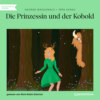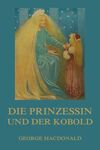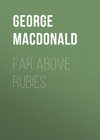Buch lesen: «St. George and St. Michael», Seite 11
With all her devotion to the king, and all her hatred and contempt of the parliament and the puritans, Dorothy could not help a doubt whether such independence might be altogether good either for the king himself or the people thus subjected to his will. But the farther doubt did not occur to her whether a pre-eminence gained chiefly by wealth was one to be on any grounds desired for the nation, or, setting that aside, was one which carried a single element favourable to perpetuity.
All this time they had been standing on the top of the keep, with the moonlight around them, and in their ears the noise of the water flowing from the dungeon well into the sky-roofed cistern. But now it came in diminished flow.
'It is the earth that fails in giving, not my engine in taking,' said lord Herbert as he turned to lead the way down the winding stair. Ever as they went, the noise of the water grew fainter and the noise of the engine grew louder, but just as they stepped from the stair, it gave a failing stroke or two, and ceased. A dense white cloud met them as they entered the vault.
'Stopped for the night, Caspar?' said his lordship.
'Yes, my lord; the well is nearly out.'
'Let it sleep,' returned his master; 'like a man's heart it will fill in the night. Thank God for the night and darkness and sleep, in which good things draw nigh like God's thieves, and steal themselves in—water into wells, and peace and hope and courage into the minds of men. Is it not so, my cousin?'
Dorothy did not answer in words, but she looked up in his face with a reverence in her eyes that showed she understood him. And this was one of the idolatrous catholics! It was neither the first nor the last of many lessons she had to receive, in order to learn that a man may be right although the creed for which he is and ought to be ready to die, may contain much that is wrong. Alas! that so few, even of such men, ever reflect, that it is the element common to all the creeds which gives its central value to each.
'I cannot show you the working of the engine to-night,' said lordHerbert. 'Caspar has decreed otherwise.'
'I can soon set her agoing again, my lord,' said Caspar.
'No, no. We must to the powder-mill, Caspar. Mistress Dorothy will come again to-morrow, and you must yourself explain to her the working and management of it, for I shall be away. And do not fear to trust my cousin, Caspar, although she be a soft-handed lady. Let her have the brute's halter in her own hold.'
Filled with gratitude for the trust he reposed in her, Dorothy took her leave, and the two workmen immediately abandoned their shop for the night, leaving the door wide open behind them to let out the vapours of the fire-engine, in the confidence that no unlicensed foot would dare to cross the threshold, and betook themselves to the powder-mill, where they continued at work the greater part of the night.
His lordship was unfavourable to the storing of powder because of the danger, seeing they could, on his calculation, from the materials lying ready for mixing, in one week prepare enough to keep all the ordnance on the castle walls busy for two. But indeed he had not such a high opinion of gunpowder but that he believed engines for projection, more powerful as well as less expensive, could be constructed, after the fashion of ballista or catapult, by the use of a mode he had discovered of immeasurably increasing the strength of springs, so that stones of a hundredweight might be thrown into a city from a quarter of a mile's distance without any noise audible to those within. It was this device he was brooding over when Dorothy came upon him by the arblast. Nor did the conviction arise from any prejudice against fire-arms, for he had, among many other wonderful things of the sort, in cannons, sakers, harquebusses, muskets, musquetoons, and all kinds, invented a pistol to discharge a dozen times with one loading, and without so much as new priming being once requisite, or the possessor having to change it out of one hand into the other, or stop his horse.
One who had happened to see lord Herbert as he went about within his father's walls, busy yet unhasting, earnest yet cheerful, rapid in all his movements yet perfectly composed, would hardly have imagined that a day at a time, or perhaps two, was all he was now able to spend there, days which were to him as breathing-holes in the ice to the wintered fishes. For not merely did he give himself to the enlisting of large numbers of men, but commanded both horse and foot, meeting all expenses from his own pocket, or with the assistance of his father. A few months before the period at which my story has arrived, he had in eight days raised six regiments, fortified Monmouth and Chepstow, and garrisoned half-a-dozen smaller but yet important places. About a hundred noblemen and gentlemen whom he had enrolled as a troop of life-guards, he furnished with the horses and arms which they were unable to provide with sufficient haste for themselves. So prominent indeed were his services on behalf of the king, that his father was uneasy because of the jealousy and hate it would certainly rouse in the minds of some of his majesty's well-wishers—a just presentiment, as his son had too good reason to acknowledge after he had spent a million of money, besides the labour and thought and dangerous endeavour of years, in the king's service.
CHAPTER XVIII
MOONLIGHT AND APPLE-BLOSSOMS
The next morning, immediately after breakfast, lord Herbert set out for Chepstow first and then Monmouth, both which places belonged to his father, and were principal sources of his great wealth.
Still, amid the rush of the changeful tides of war around them, and the rumour of battle filling the air, all was peaceful within the defences of Raglan, and its towers looked abroad over a quiet country, where the cattle fed and the green wheat grew. On the far outskirts of vision, indeed, a smoke might be seen at times from the watch-tower, and across the air would come the dull boom of a great gun from one of the fortresses, at which lady Margaret's cheek would turn pale; but, although every day something was done to strengthen the castle, although masons were at work here and there about the walls like bees, and Caspar Kaltoff was busy in all directions, now mounting fresh guns, now repairing steel cross-bows, now getting out of the armoury the queerest oldest-fashioned engines to place wherever available points could be found, there was no hurry and no confusion, and indeed so little appearance of unusual activity, that an unmilitary stranger might have passed a week in the castle without discovering that preparations for defence were actively going on. All around them the buds were creeping out, uncurling, spreading abroad, straightening themselves, smoothing out the creases of their unfolding, and breathing the air of heaven—in some way very pleasant to creatures with roots as well as to creatures with legs. The apple-blossoms came out, and the orchard was lovely as with an upward-driven storm of roseate snow. Ladies were oftener seen passing through the gates and walking in the gardens—where the fountains had begun to play, and the swans and ducks on the lakes felt the return of spring in every fibre of their webby feet and cold scaly legs.
And Dorothy sat as it were at the spring-head of the waters, for, through her dominion over the fire-engine, she had become the naiad of Raglan. The same hour in which lord Herbert departed she went to Kaltoff, and was by him instructed in its mysteries. On the third day after, so entirely was the Dutchman satisfied with her understanding and management of it, that he gave up to her the whole water-business. And now, as I say, she sat at the source of all the streams and fountains of the place, and governed them all. The horse of marble spouted and ceased at her will, but in general she let the stream from his mouth flow all day long. Every water-cock on the great tower was subject to her. From the urn of her pleasure the cistern was daily filled, and from the summit of defence her flood went pouring into the moat around its feet, until it mantled to the brim, turning the weeds into a cold shadowy pavement of green for a foil to its pellucid depth. She understood all the secrets of the aqueous catapult, at which its contriver had little more than hinted on that memorable night when he disclosed so much, and believed she could arrange it for action without assistance. At the same time her new responsibilities required but a portion of her leisure, and lady Margaret was not the less pleased with the wise-headed girl, whose manners and mental ways were such a contrast to her own, that her husband considered her fit to be put in charge of his darling invention. But Dorothy kept silence concerning the trust to all but her mistress, who, on her part, was prudent enough to avoid any allusion which might raise yet higher the jealousy of her associates, by whom she was already regarded as supplanting them in the favour of their mistress.
One lovely evening in May, the moon at the full, the air warm yet fresh, the apple-blossoms at their largest, with as yet no spot upon their fair skin, and the nightingales singing out of their very bones, the season, the hour, the blossoms, and the moon had invaded every chamber in the castle, seized every heart of both man and beast, and turned all into one congregation of which the nightingales were the priests. The cocks were crowing as if it had been the dawn itself instead of its ghost they saw; the dogs were howling, but whether that was from love or hate of the moon, I cannot tell; the pigeons were cooing; the peacock had turned his train into a paralune, understanding well that the carnival could not be complete without him and his; and the wild beasts were restless, uttering a short yell now and then, at least aware that something was going on. All the inhabitants of the castle were out of doors, the ladies and gentlemen in groups here and there about the gardens and lawns and islands, and the domestics, and such of the garrison as were not on duty, wandering hither and thither where they pleased, careful only not to intrude on their superiors.
Lady Margaret was walking with her step-son Henry on a lawn under the northern window of the picture-gallery, and there the ladies Elizabeth and Anne joined them—the former a cheerful woman, endowed with a large share of her father's genial temperament; joke or jest would moult no feather in lady Elizabeth's keeping; the latter quiet, sincere, and reverent. The marquis himself, notwithstanding a slight attack of the gout, had hobbled on his stick to a chair set for him on the same lawn. Beside him sat lady Mary, younger than the other two, and specially devoted to her father.
Their gentlewomen were also out, flitting in groups that now and then mingled and changed. Rowland Scudamore joined lady Margaret's people, and in a moment lady Broughton was laughing merrily. But mistress Doughty walked on with straight neck, as if there were nobody but herself in heaven or on the earth, although mortals were merry by her side, and nightingales singing themselves to death over her head. Behind them came Amanda Serafina, with her eyes on her feet, and the corners of her pretty mouth drawn down in contempt of nobody in particular. Now and then Scudamore, when satisfied with his own pretty wit, would throw a glance behind him, and she, somehow or other, would, without change of muscle, let him know that she had heard him. This group sauntered into the orchard.
After them came Dorothy with Dr Bayly, talking of their common friend Mr. Matthew Herbert, and following them into the orchard, wandered about among the trees, under the curdled moonlight of the apple-blossoms, amid the challenges and responses of five or six nightingales, that sang as if their bodies had dwindled under the sublimating influences of music, until, with more than cherubic denudation, their sum of being was reduced to a soul and a throat.
Moonlight, apple-blossoms, nightingales, with the souls of men and women for mirrors and reflectors! The picture is for the musician not the painter, either him of words or him of colours. It was like a lovely show in the land of dreams, even to the living souls that moved in and made part of it. The earth is older now, colder at the heart, a little nearer to the fate of cold-hearted things, which is to be slaves and serve without love; but she has still the same moonlight, the same apple-blossoms, the same nightingales, and we have the same hearts, and so can understand it. But, alas! how differently should we come in amongst the accessories of such a picture! For we men at least are all but given over to ugliness, and, artistically considered, even vulgarity, in the matter of dress, wherein they, of all generations of English men and women, were too easily supreme both as to form and colour. Hence, while they are an admiration to us, we shall be but a laughter to those that come behind us, and that whether their fashions be better than ours or no, for nothing is so ridiculous as ugliness out of date. The glimmer of gold and silver, the glitter of polished steel, the flashing of jewels, and the flowing of plumes, went well. But, so canopied with loveliness, so besung with winged passion, so clothed that even with the heavenly delicacies enrounding them they blended harmoniously, their moonlit orchard was an island beat by the waves of war, its air would quiver and throb by fits, shaken with the roar of cannon, and might soon gleam around them with the whirring sweep of the troopers' broad blades; while all throughout the land, the hateful demon of party spirit tore wide into gashes the wounds first made by conscience in the best, and by prejudice in the good.
The elder ladies had floated away together between the mossy stems, under the canopies of blossoms; Rowland had fallen behind and joined the waiting Amanda, and the two were now flitting about like moths in the moonshine; Dorothy and Dr. Bayly had halted in an open spot, like a moonlight impluvium, the divine talking eagerly to the maiden, and the maiden looking up at the moon, and heeding the nightingales more than the divine.
'CAN they be English nightingales?' said Dorothy thoughtfully.
The doctor was bewildered for a moment. He had been talking about himself, not the nightingales, but he recovered himself like a gentleman.
'Assuredly, mistress Dorothy,' he replied; 'this is the land of their birth. Hither they come again when the winter is over.'
'Yes; they take no part in our troubles. They will not sing to comfort our hearts in the cold; but give them warmth enough, and they sing as careless of battle-fields and dead men as if they were but moonlight and apple-blossoms.'
'Is it not better so?' returned the divine after a moment's thought.'How would it be if everything in nature but re-echoed our moan?'
Dorothy looked at the little man, and was in her turn a moment silent.
'Then,' she said, 'we must see in these birds and blossoms, and that great blossom in the sky, so many prophets of a peaceful time and a better country, sent to remind us that we pass away and go to them.'
'Nay, my dear mistress Dorothy!' returned the all but obsequious doctor; 'such thoughts do not well befit your age, or rather, I would say, your youth. Life is before you, and life is good. These evil times will go by, the king shall have his own again, the fanatics will be scourged as they deserve, and the church will rise like the phoenix from the ashes of her purification.'
'But how many will lie out in the fields all the year long, yet never see blossoms or hear nightingales more!' said Dorothy.
'Such will have died martyrs,' rejoined the doctor.
'On both sides?' suggested Dorothy.
Again for a moment the good man stood checked. He had not even thought of the dead on the other side.
'That cannot be,' he said. And Dorothy looked up again at the moon.
But she listened no more to the songs of the nightingales, and they left the orchard together in silence.
'Come, Rowland, we must not be found here alone,' said Amanda, who saw them go. 'But tell me one thing first: is mistress Dorothy Vaughan indeed your cousin?'
'She is indeed. Her mother and mine were cousins german—sisters' children.'
'I thought it could not be a near cousinship. You are not alike at all.Hear me, Rowland, but let it die in your ear—I love not mistressDorothy.'
'And the reason, lovely hater? "Is not the maiden fair to see?" as the old song says. I do not mean that she is fair as some are fair, but she will pass; she offends not.'
'She is fair enough—not beautiful, not even pleasing; but, to be just, the demure look she puts on may bear the fault of that. Rowland, I would not speak evil of any one, but your cousin is a hypocrite. She is false at heart, and she hates me. Trust me, she but bides her time to let me know it—and you too, my Rowland.'
'I am sure you mistake her, Amanda,' said Scudamore. 'Her looks are but modest, and her words but shy, for she came hither from a lonely house. I believe she is honest and good.'
'Seest thou not then how that she makes friends with none but her betters? Already hath she wound herself around my lady's heart, forsooth! and now she pays her court to the puffing chaplain! Hast thou never observed, my Rowland, how oft she crosses the bridge to the yellow tower? What seeks she there? Old Kaltoff, the Dutchman, it can hardly be. I know she thinks to curry with my lord by pretending to love locks and screws and pistols and such like. "But why should she haunt the place when my lord is not there?" you will ask. Her pretence will hold the better for it, no doubt, and Caspar will report concerning her. And if she pleases my lord well, who knows but he may give her a pair of watches to hang at her ears, or a box that Paracelsus himself could not open without the secret as well as the key? I have heard of both such. They say my lord hath twenty cartloads of quite as wonderful things in that vault he calls his workshop. Hast thou never marked the huge cabinet of black inlaid with silver, that stands by the wall—fitter indeed for my lady's chamber than such a foul place?'
'I have seen it,' answered Scudamore.
'I warrant me it hath store of gewgaws fit for a duchess.'
'Like enough,' assented Rowland.
'If mistress Dorothy were to find the way through my lord's favour into that cabinet—truly it were nothing to thee or me, Rowland.'
'Assuredly not. It would be my lord's own business.'
'Once upon a time I was sent to carry my young lady Raven thither—to see my lord earn his bread, as said my lady: and what should my lord but give her no less than a ball of silver which, thrown into a vessel of water at any moment would plainly tell by how much it rose above the top, the very hour and minute of the day or night, as well and truly as the castle-clock itself. Tell me not, Rowland, that the damsel hath no design in it. Her looks betoken a better wisdom. Doth she not, I ask your honesty, far more resemble a nose-pinched puritan than a loyal maiden?'
Thus amongst the apple-blossoms talked Amanda Serafina.
'Prithee, be not too severe with my cousin, Amanda,' pleaded Scudamore. 'She is much too sober to please my fancy, but wherefore should I for that hate her? And if she hath something the look of a long-faced fanatic, thou must think, she hath but now, as it were, lost her mother.'
'But now! And I never knew mine! Ah, Rowland, how lonely is the world!'
'Lovely Amanda!' said Rowland.
So they passed from the orchard and parted, fearful of being missed.
How should such a pair do, but after its kind? Life was dull without love-making, so they made it. And the more they made, the more they wanted to make, until casual encounters would no longer serve their turn.
CHAPTER XIX
THE ENCHANTED CHAIR
In the castle things went on much the same, nor did the gathering tumult without wake more than an echo within. Yet a cloud slowly deepened upon the brow of the marquis, and a look of disquiet, to be explained neither by the more frequent returns of his gout, nor by the more lengthened absences of his favourite son. In his judgment the king was losing ground, not only in England but in the deeper England of its men. Lady Margaret also, for all her natural good spirits and light-heartedness, showed a more continuous anxiety than was to be accounted for by her lord's absences and the dangers he had to encounter: little Molly, the treasure of her heart next to her lord, had never been other than a delicate child, but now had begun to show signs of worse than weakness of constitution, and the heart of the mother was perpetually brooding over the ever-present idea of her sickly darling.
But she always did her endeavour to clear the sky of her countenance before sitting down with her father-in-law at the dinner-table, where still the marquis had his jest almost as regularly as his claret, although varying more in quality and quantity both—now teasing his son Charles about the holes in his pasteboard, as he styled the castle walls; now his daughter Anne about a design, he and no one else attributed to her, of turning protestant and marrying Dr. Bayly; now Dr. Bayly about his having been discovered blowing the organ in the chapel at high mass, as he said; for when no new joke was at hand he was fain to content himself with falling back upon old ones. The first of these mentioned was founded on the fact, as undeniable as deplorable, of the weakness of many portions of the defences, to remedy which, as far as might be, was for the present lord Charles's chief endeavour, wherein he had the best possible adviser, engineer, superintendent, and workman, all in the person of Caspar Kaltoff. The second jest of the marquis was a pure invention upon the liking of lady Anne for the company and conversation of the worthy chaplain. The last mentioned was but an exaggeration of the following fact.
One evening the doctor came upon young Delaware, loitering about the door of the chapel, with as disconsolate a look as his lovely sightless face was ever seen to wear, and, inquiring what was amiss with him, learned that he could find no one to blow the organ bellows for him. The youth had for years, boy as he still was, found the main solace of his blindness in the chapel-organ, upon which he would have played from morning to night could he have got any one to blow as long. The doctor, then, finding the poor boy panting for music like the hart for the water-brooks, but with no Jacob to roll the stone from the well's mouth that he might water the flocks of his thirsty thoughts, made willing proffer of his own exertions to blow the bellows of the organ, so long as the somewhat wheezy bellows of his body would submit to the task.
By degrees however the good doctor had become so absorbed in the sounds that rushed, now wailing, now jubilant, now tender as a twilight wind, now imperious as the voice of the war-tempest, from the fingers of the raptured boy, that the reading of the first vesper-psalm had commenced while he was yet watching the slow rising index, in the expectation that the organist was about to resume. The voice of his Irish brother-chaplain, Sir Toby Mathews, roused him from his reverie of delight, and as one ashamed he stole away through the door that led from the little organ loft into the minstrel's gallery in the great hall, and so escaped the catholic service, but not the marquis's roasting. Whether the music had any share in the fact that the good man died a good catholic at last, I leave to the speculation of who list.
Lady Margaret continued unchangingly kind to Dorothy; and the tireless efforts of the girl to amuse and please poor little Molly, whom the growing warmth of the season seemed to have no power to revive, awoke the deep gratitude of a mother. This, as well as her husband's absences, may have had something to do with the interest she began to take in the engine of which Dorothy had assumed the charge, for which she had always hitherto expressed a special dislike, professing to regard it as her rival in the affections of her husband, but after which she would now inquire as Dorothy's baby, and even listen with patience to her expositions of its wonderful construction and capabilities. Ere long Dorothy had a tale to tell her in connection with the engine, which, although simple and uneventful enough, she yet found considerably more interesting, as involving a good deal of at least mental adventure on the part of her young cousin.
One evening, after playing with little Molly for an hour, then putting her to bed and standing by her crib until she fell asleep, Dorothy ran to see to her other baby; for the cistern had fallen rather lower than she thought well, and she was going to fill it. She found Caspar had lighted the furnace as she had requested; she set the engine going, and it soon warmed to its work.
The place was hot, and Dorothy was tired. But where in that wide and not over-clean place should she find anything fitter than a grindstone to sit upon? Never yet, through all her acquaintance with the workshop, had she once seated herself in it. Looking about, however, she soon espied, almost hidden in the corner of a recess behind the furnace, what seemed an ordinary chair, such as stood in the great hall for the use of the family when anything special was going on there. With some trouble she got it out, dusted it, and set it as far from the furnace as might be, consistently with watching the motions of the engine. But the moment she sat down in it, she was caught and pinned so fast that she could scarcely stir hand or foot, and could no more leave it again than if she had been paralyzed in every limb. One scream she uttered of mingled indignation and terror, fancying herself seized by human arms; but when she found herself only in the power of one of her cousin's curiosities, she speedily quieted herself and rested in peace, for Caspar always paid a visit to the workshop the last thing before going to bed. The pressure of the springs that had closed the trap did not hurt her in the least—she was indeed hardly sensible of it; but when she made the least attempt to stir, the thing showed itself immovably locked, and she had too much confidence in the workmanship of her cousin and Caspar to dream of attempting to open it: that she knew must be impossible. The worst that threatened her was that the engine might require some attention before the hour, or perhaps two, which must elapse ere Caspar came would be over, and she did not know what the consequences might be.
As it happened, however, something either in the powder-mill or about the defences detained Caspar far beyond his usual hour for retiring, and the sultriness of the weather having caused him a headache, he represented to himself that, with mistress Dorothy tending the engine, who knew where and would be sure to find him upon the least occasion, there could be no harm in his going to bed without paying his usual precautionary visit to the keep.
So Dorothy sat, and waited in vain. The last drops of the day trickled down the side of the world, the night filled the crystal globe from its bottom of rock to its cover of blue aether, and the red glow of the furnace was all that lighted the place. She waited and waited in her mind; but Caspar did not come. She began to feel miserable. The furnace fire sank, and the rush of the water grew slower and slower, and ceased. Caspar did not come. The fire sank lower and lower, its red eye dimmed, darkened, went out. Still Caspar did not come. Faint fears began to gather about poor Dorothy's heart. It was clear at last that there she must be all the night long, and who could tell how far into the morning? It was good the night was warm, but it would be very dreary. And then to be fixed in one position for so long! The thought of it grew in misery faster than the thing itself. The greater torment lies always in the foreboding. She felt almost as if she were buried alive. Having their hands tied even, is enough to drive strong men almost crazy. Nor, firm of heart as she was, did no evils of a more undefined and less resistible character claim a share in her fast-rising apprehensions; she began to discover that she too was assailable by the terror of the night, although she had not hitherto been aware of it, no one knowing what may lie unhatched in his mind, waiting the concurrence of vital conditions.
But Dorothy was better able to bear up under such assaults than thousands who believe nothing of many a hideous marvel commonly accepted in her day; and anyhow the unavoidable must be encountered, if not with indifference, yet with what courage may be found responsive to the call of the will. So, with all her energy, a larger store than she knew, she braced herself to endure. As to any attempt to make herself heard, she knew from the first that was of doubtful result, and now must certainly be of no avail when all but the warders were asleep. But to spend the night thus was a far less evil than to be discovered by the staring domestics, and exposed to the open merriment of her friends, and the hidden mockery of her enemies. As to Caspar, she was certain of his silence. So she sat on, like the lady in Comus, 'in stony fetters fixed and motionless;' only, as she said to herself, there was no attendant spirit to summon Caspar, who alone could take the part of Sabrina, and 'unlock the clasping charm.' Little did Dorothy think, as in her dreary imprisonment she recalled that marvellous embodiment of unified strength and tenderness, as yet unacknowledged of its author, that it was the work of the same detestable fanatic who wrote those appalling 'Animadversions, &c.'
She grew chilly and cramped. The night passed very slowly. She dozed and woke, and dozed again. At last, from very weariness of both soul and body, she fell into a troubled sleep, from which she woke suddenly with the sound in her ears of voices whispering. The confidence of lord Herbert, both in the evil renown of his wizard cave and the character of his father's household, seemed mistaken. Still the subdued manner of their conversation appeared to indicate it was not without some awe that the speakers, whoever they were, had ventured within the forbidden precincts; their whispers, indeed, were so low that she could not say of either voice whether it belonged to man or woman. Her first idea was to deliver herself from the unpleasantness of her enforced espial by the utterance of some frightful cry such as would at the same time punish with the pains of terror their fool-hardy intrusion. But the spur of the moment was seldom indeed so sharp with Dorothy as to drive her to act without reflection, and a moment showed her that such persons being in the marquis's household as would meet in the middle of the night, and on prohibited ground, apparently for the sake of avoiding discovery, and even then talked in whispers, he had a right to know who they were: to act from her own feelings merely would be to fail in loyalty to the head of the house. Who could tell what might not be involved in it? For was it not thus that conspiracy and treason walked? And any alarm given them now might destroy every chance of their discovery. She compelled herself therefore to absolute stillness, immeasurably wretched, with but one comfort—no small one, however, although negative—that their words continued inaudible, a fact which doubtless saved much dispute betwixt her propriety and her loyalty.




















